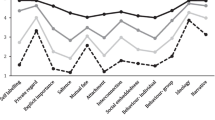Abstract
This study employed constructs derived from theories of social identity and collective action to test predictors of feminist social identity. The sample consisted of 95 Anglos, 36 African-Americans, 38 Asians, 43 Latinas, and 14 women who chose not to disclose their ethnicity. A two-step hierarchical multiple regression on these data showed that, as a group, positive evaluation of feminists, positive opinion of the feminist movement, exposure to feminism, recognition of discrimination against women, and belief in collective action contributed significantly to the prediction of feminist social identity, after support for feminist goals was entered into the equation. For a subsample of 36 African-American women, intercorrelations showed that racial identification, as well as a perception of conflict between racial identity and feminist identity, are compatible with aspects of feminist beliefs and values. Nevertheless, substantial differences between white women and women of color were found in willingness to socially identify as a feminist. Results support the importance of distinguishing between private feminist self-labeling and more social forms of feminist identification.
Similar content being viewed by others
References
Cowan, G., Mestlin, M., & Masek, J. (1992). Predictors of feminist self-labeling.Sex Roles, 27, 321–330.
Crawford, V.L., Rouse, J.A., & Woods, B. (1990).Women in the civil rights movement. Bloomington: Indiana University Press.
Cross, W E., Jr. (1971). The negro-to-Black conversion experience.Black World, 20, 12–27.
Downing, N. E., & Roush, K. L. (1985). From passive acceptance to active commitment: A model of feminist identity development in women.The Counseling Psychologist, 13, 695–709.
Fujino, D., & King, K. (1994).Womanist identity issues: The integration of ethnic and gender identities for women of color. Paper presented at the 102nd annual convention of the American Psychological Association, Los Angeles, CA.
Helms, J. E. (1990). The measurement of Black racial identity attitudes. In J. E. Helms (Ed.),Black and white racial identity. New York: Greenwood Press.
Hemmons, W. M. (1980) The women’s liberation movement: Understanding Black women’s attitudes. In L. F. Rodgers-Rose (Ed.),The Black Woman. Beverly Hills, CA: Sage Press.
Kaminer, W. (1993, October). Feminism’s identity crisis.The Atlantic Monthly, pp. 51–68.
Martin, J. K., & Hall, G. C. N. (1992). Thinking Black, thinking internal, thinking feminist.Journal of Counseling Psychology, 39, 509–514.
McGlen, N. E., & O’Connor, K. (1980). An analysis of the U.S. women’s rights movements: Rights as a public good.Women and Politics, 1, 65–85.
Morgan, B. L. (1996). Putting the feminism into feminism scales: Introduction of a liberal feminist attitude and ideology scale (LFAIS).Sex Roles, 34, 359–390.
Parham, T. A. and Helms, J. E. (1981). The influence of Black student’s racial identity attitudes on preferences for counselor’s race.Journal of Counseling Psychology, 28, 250–257.
Reid, P. T. (1984). Feminism versus minority group identity: Not for Black women only.Sex Roles, 10, 247–255.
Renzetti, C. M. (1987). New wave or second stage? Attitudes of college women toward feminism.Sex Roles, 16, 265–277.
Rowland, R. (1986). Women who do and women who don’t, join the women’s movement: Issues for conflict and collaboration.Sex Roles, 14, 679–692.
Sommers, C. H. (1994).Who stole feminism?: How women have retrayed women. New York: Simon & Schuster.
Tajfel, H. (1978). Social categorization, social identity, and social comparison. In H. Tajfel (ed.),Differentiation between social groups. London and New York: Academic Press.
Taylor, D. M., & McKirnan, D. J. (1984). A five-stage model of intergroup relations.British Journal of Social Psychology, 23, 291–300.
Taylor, D. M., & Moghaddam, F. M. (1987). Social identity theory. In D. M. Taylor & F. M. Moghaddam (Eds.),Theories of intergroup relations. Westport, CT: Praeger Publishers.
Taylor, D. M., Moghaddam, F. M., Gamble, I., & Zellerer, E. (1988). Disadvantaged group responses to perceived inequality: From passive acceptance to collective action.Journal of Social Psychology, 127, 259–272.
Williams, R., & Wittig, M. A. (1997). “I’m not a feminist, but...”: Factors contributing to the discrepancy between pro-feminist orientation and feminist social identity.Sex Roles, 37, 885–904.
Woliver, L. R. (1993).From outrage to action: The politics of grass-roots dissent. Urbana, IL: University of Illinois.
Author information
Authors and Affiliations
Corresponding authors
Additional information
This paper is based upon the study completed by Larissa Myaskovsky for her thesis in partial fulfillment of the requirements for the degree of master of arts in psychology. The second author gratefully acknowledges the support of the Henry A. Murray Center, Radcliffe College. Special thanks go to Professor Brett W. Pelham at the Department of Psychology, University of California, Los Angeles, and Carey S. Ryan at the Department of Psychology, University of Pittsburgh, for help with a comprehensive review of the manuscript and suggestions on data interpretation.
Rights and permissions
About this article
Cite this article
Myaskovsky, L., Wittig, M.A. Predictors of feminist social identity among college women. Sex Roles 37, 861–883 (1997). https://doi.org/10.1007/BF02936344
Issue Date:
DOI: https://doi.org/10.1007/BF02936344



